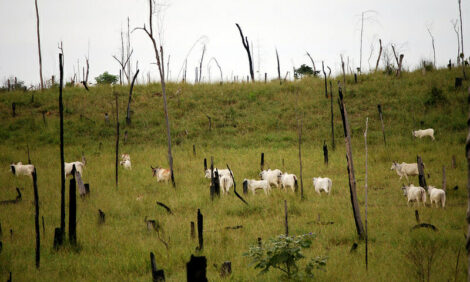



NC State Vets Trained To Respond To Disasters
US - North Carolina State University is including training for its veterinary students in coping with emergencies involving farm livestock and pets.Most people can picture the first responders who come to the rescue in the wake of a natural disaster. But who provides emergency help for the dogs, cats and horses that people love? And who takes care of the cows, poultry and hogs that form the backbone of animal agriculture? The College of Veterinary Medicine at North Carolina State University is helping to fill the need through a unique initiative that requires all of its students to receive disaster training, providing a new generation of leaders in veterinary medicine and disaster response.
"This training programme is important because there is a real need to build our capacity to respond to disasters," said Dr Dianne Dunning, co-author of a recent study on NC State's landmark training requirement and director of the university's Animal Welfare, Ethics and Public Policy Program.
"Emergency response is generally geared towards people, particularly at the local level. We need to protect the health of the people and the health of the animals – whether they are pets or livestock related to a region's livelihood. We believe this training will help veterinarians respond to the needs of both people and animals.
"NC State has the only college of veterinary medicine that requires all of its students to take a formal disaster response training programme, and we hope this is a model for others to follow," she said. Students, who must take the programme to graduate, earn advanced state and federal disaster training certifications.
The training programme deals with a variety of disaster response issues associated with a staggering array of animals. Students are taught how to work with displaced people and their pets. For example, learning how to set up and operate mobile animal shelters that can be located near emergency shelters for displaced people.
Students are also taught how to respond to an epidemic in livestock in order to stop disease from spreading, a crucial step in preventing disruption of local and regional economies that depend on animal agriculture. Preventive measures include quarantining animals, as well as ensuring that veterinarians, farmers and others do not spread the disease on their clothes or shoes.
But the disaster training is not limited to dealing with animals – it extends to overarching planning and response.
Dr Dunning said: "The course gives our students the skills they need to become leaders in their communities when it comes to disaster response. The training touches on a host of skills required in the wake of a disaster: fundamental psychology, effective communication, hazardous material handling, and the ability to anticipate, identify, and respond to new needs as they crop up."
The training programme is part of the NC State College of Veterinary Medicine's 'One Medicine' philosophy, which focuses on the belief that human and animal health rely on overlapping fields of scientific and medical knowledge, and related fields of research.
The paper outlining the emergency response training programme was published in the fall issue of the Journal of Veterinary Medical Education. The paper was co-authored by NC State's Drs Dunning, Michael Martin, Peter Cowen and Barrett Slenning, Dr Jimmy Tickel of the North Carolina Department of Agriculture and Dr Bill Gentry of the University of North Carolina at Chapel Hill.
Further Reading
| - | You can view the abstract of the paper by Dr Dunning et al. by clicking here. |
TheCattleSite News Desk


